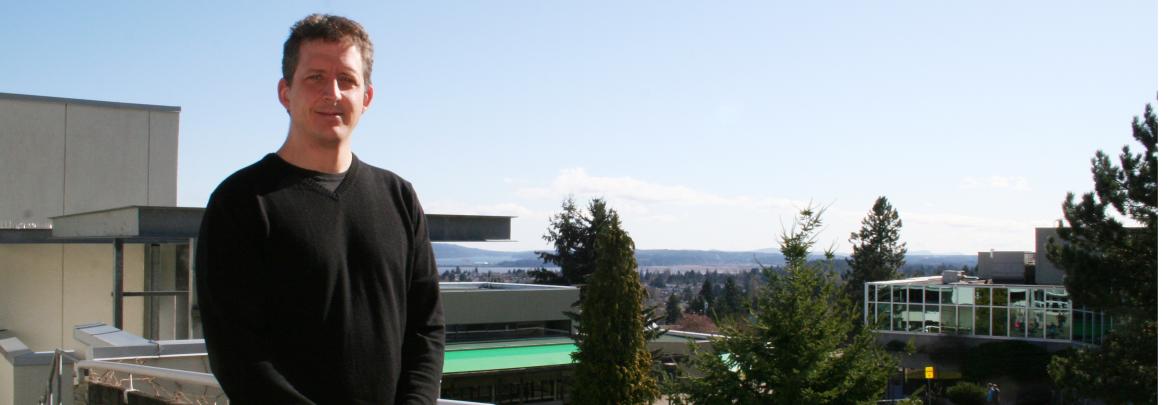
March 22, 2012 - 2:08am
Dr. Grant Murray and his team at Vancouver Island University’s Institute for Coastal Research (ICR) have spectacular reminders of their raison d’etre when they look east from their vantage point on the fourth floor for the Nanaimo campus Library building.
The panoramic view beyond downtown Nanaimo includes ferries and freighters navigating the Strait of Georgia. Off to the southeast, the Harmac mill demonstrates one of the region’s strongest economic generators. Bald eagles are often seen soaring above the Nanaimo estuary, an important natural resource that has long been highly valued by the Snuneymuxw First Nation.
As Canada Research Chair in Coastal Resource Management since 2006, Murray has developed an interdisciplinary approach at the ICR to focus on a range of issues from impoverished families on the edge of protected areas to enhancing the value of British Columbia seafood to the province’s coastal communities.
Murray was recently appointed to a second five-year term through the federal government initiative overseen by the Social Sciences and Humanities Research Council and Ministry of Industry.
He welcomes the opportunity to continue his work on Vancouver Island and internationally. “It’s a major goal for me to have the ICR recognized as a hub of excellence in interdisciplinary research and dialogue on the human dimension of coastal resources and coastal issues,” says Murray.
In addition to public symposia and workshops and a range of research projects, the ICR has established an ICR Fellows program to support scholarly activity at VIU. The first two ICR Fellows are beginning work in the spring of 2012.
Under the leadership of Michele Patterson, the Aquatic Foods Initiative–a joint project of the ICR and the non-profit BC Aquatic Foods and Resources Society – is fostering innovation to support sustainability and efficiency in aquaculture.
As co-director of Protected Areas and Poverty Reduction: A Canada-Africa Research and Learning Alliance, Murray is part of a team that is examining the relationship between protected areas and adjacent communities in Canada, Ghana and Tanzania.
It is a complex issue that involves inquiries into areas such as human-wildlife encounters and the costs and benefits of tourism development in protected areas.
“Tourism development might not be good for everyone,” says Murray. “It’s important to look at how many dollars come in and who gets them.”
Murray has worked closely with the Tla-o-qui-aht First Nation in Clayoquot Sound on the west coast of Vancouver Island and the First Nation’s initiative to establish Tribal Parks that are managed according to ancestral teachings to integrate the well-being of humans and the ecosystem.
Indigenous communities, whether in Canada or Africa, face significant challenges as they pursue higher standards of living while protecting natural habitat.
“Poverty makes it difficult to deal with environmental concerns,” says Murray. “People who are worried about shelter or putting food on the table or sending their kids to school often find it difficult to deal with environmental concerns. It’s not always the case but it complicates the issue.”
He adds that a degraded environment contributes to economic problems. “If you don’t have an accessible clam beach or you can’t eat the fish, if you can’t hunt or gather fire wood, it leads to food insecurity and contributes to poverty.”
“I’m interested in the question, ‘Can we demonstrate that environmental conservation pays off in terms of poverty alleviation?’ It sounds good: ‘Take care of your land or your ocean and you’ll be better off.’ Proving that and demonstrating how it happens is challenging. People want evidence.”
Murray has placed a strong emphasis on building relationships, externally and within the university community to foster an interdisciplinary approach to coastal issues. He values a broad range of perspectives on resource management in addition to those based in natural sciences such as ecology and biology.
“So much of resource management is values-based as well as science-based. We need other disciplines involved to help understand the values at play,” says Murray. “There’s a growing recognition that we need social sciences. We really need those in the humanities – artists and writers – people who change minds.”
On the web:
[Institute for Coastal Research]()
[Research and Scholarly Activity at VIU]()
Tags: In the Community






